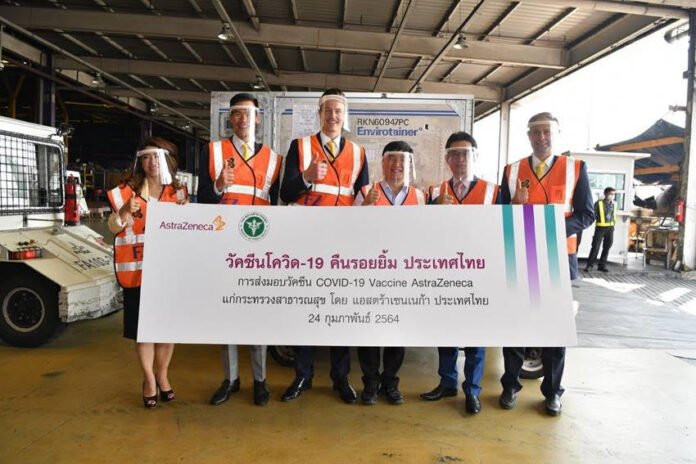The following is a press release from AstraZeneca. Their thoughts and opinions are their own.
The first doses of the AstraZeneca COVID-19 vaccine arrived today in Thailand’s Suvarnabhumi Airport ahead of schedule, bringing renewed hope to the country’s fight against the pandemic. The batch of 117,600 doses landed on the runway to a fanfare, representing the first vaccines to arrive in the country to fight the virus.
COVID-19 Vaccine AstraZeneca, which is licensed for active immunization to prevent COVID-19 in individuals 18 years and older, is currently undergoing final quality control testing, after which it will be handed over so that the local vaccination program can begin.
The vaccine has been shown to be safe and effective at preventing symptomatic COVID-19 when taken as two doses administered at a four to the 12-week interval. It has been shown to be 100% protective against severe disease, hospitalization, and death, more than 22 days after the first dose is administered.
Recent research has shown there is an increased efficacy when doses are given with a longer inter-dose interval, including over 12 weeks. With a longer inter-dose interval efficacy against symptomatic disease increases from 76% (CI: 59% to 86%) to 82% (CI: 63%, 92%).
The vaccine can be easily stored, transported, and handled at normal refrigerated conditions of between two to eight degrees Celsius. It can be held for at least six months and administered within existing healthcare settings.
This batch of vaccines is manufactured by AstraZeneca through its global supply chain. To ensure broad and equitable access to the vaccine, AstraZeneca moved at a pace during 2020 to build more than a dozen regional supply chains leveraging the company’s own industrial capacity and additionally working with more than 20 partners to accelerate vaccine production and supply.
Commenting on the arrival of the vaccine doses, Anutin Charnvirakul, Minister for Public Health and Deputy Prime Minister of Thailand, said:
“This is a great day for Thailand. These vaccine doses represent the first step in a journey to fight against the COVID-19 pandemic in our country. The inoculation program will begin as soon as possible to protect those most at risk from the virus. A key priority for us is to vaccinate frontline medical personnel, health workers, and personnel involved in Covid-19 control. This is part of a wider plan to help overcome the pandemic and I am looking forward to seeing the first dose being administered in Thailand and continuing this vital journey.”
Commenting on the delivery of the vaccines James Teague, Country President, AstraZeneca (Thailand) Ltd. said:
“Watching our first doses of the vaccine arrive in Thailand is monumental for us and a testament to the dedication of our team working tirelessly to deliver the vaccine ahead of schedule. This is also an important step for AstraZeneca in achieving our commitment to ensure that as many countries as possible can access our vaccine to help end this pandemic.”
COVID-19 Vaccine AstraZeneca, formerly AZD1222
COVID-19 Vaccine AstraZeneca was co-invented by the University of Oxford and its spin-off company, Vaccitech. It uses a replication-deficient chimpanzee viral vector based on a weakened version of a common cold virus (adenovirus) that causes infections in chimpanzees and contains the genetic material of the SARS-CoV-2 virus spike protein. After vaccination, the surface spike protein is produced, priming the immune system to attack the SARS-CoV-2 virus if it later infects the body.
Efficacy was established by a pooled analysis of 11,636 participants aged 18 years and older, accruing 131 symptomatic COVID-19 infections from the UK and Brazil Phase III trials conducted by Oxford University.
Overall safety was based on an interim analysis of pooled data from four clinical trials conducted in the UK, Brazil, and South Africa which included 23,745 participants aged 18 years or older. COVID-19 Vaccine AstraZeneca was well tolerated and there were no serious safety events confirmed related to the vaccine. The participants were from diverse ethnic and geographic groups who were healthy or had stable underlying medical conditions.
In addition to the program led by Oxford University, AstraZeneca is conducting a large trial in the US and globally. In total, Oxford University and AstraZeneca expect to enroll up to 60,000 participants globally.
AstraZeneca’s COVID-19 vaccine has been granted conditional marketing authorization or emergency use approval in more than 50 countries, with the World Health Organization Emergency Use Listing accelerating the pathway to access in up to 145 countries through the COVAX Facility, the global procurement arm of COVID-19 Vaccines Global Access (COVAX).




